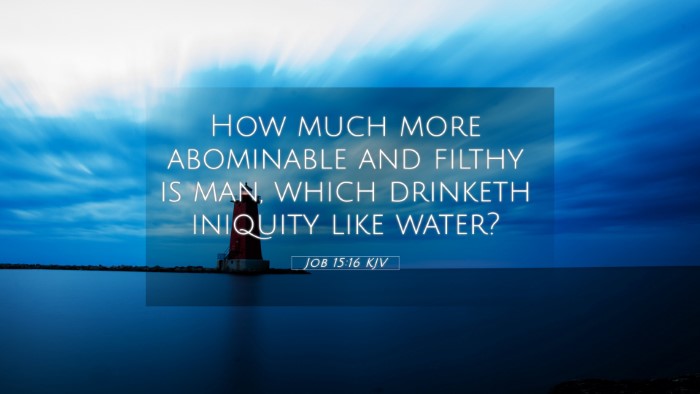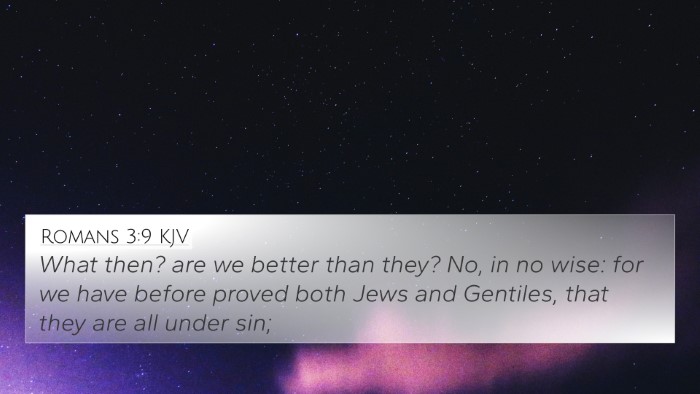Understanding Job 15:16
Verse: "How much more abominable and filthy is man, which drinketh iniquity like water?" (Job 15:16 KJV)
This verse falls within the discourse of Eliphaz the Temanite, who is speaking to Job regarding the nature of mankind and sinfulness. Eliphaz’s intention is to emphasize the depth of human depravity and the inherent sinfulness of man, suggesting that this condition is akin to drinking iniquity as one would drink water.
Commentary Insights
Matthew Henry's Commentary
Matthew Henry suggests that Eliphaz's statement reflects a general view that highlights the severity of human sin. He insists that man is inherently sinful and emphasizes the idea that if men are even more abhorrent before God, their actions are rooted in a nature prone to evil. This biblical perspective enhances the understanding of sin—indicating that it is not just an action but rooted in the very essence of humanity.
Albert Barnes' Commentary
Albert Barnes offers a similar view, remarking that the phrase "drinks iniquity like water" illustrates how man easily indulges in sin. Barnes interprets this as a clear accusation against human nature, suggesting that it is a tendency for individuals to engage in wrongdoing with the same ease and frequency as drinking. This reveals a stark view of humanity as perpetually engaged in moral and spiritual depravity without seeking redemption.
Adam Clarke's Commentary
Adam Clarke provides a linguistic analysis of the term "filthy," equating sinfulness to unacceptable, dirty behavior that is culturally loathed. Clarke posits that the emphasis here is to provoke introspection regarding the sinful state of man and elicit a sense of accountability before God. He also draws parallels to the moral state present in the society during Job's time, indicating a broader application of Eliphaz's observations.
Theological Implications
Job 15:16 serves as a reminder of the fallen state of humanity and the need for redemption. The verse not only illustrates the gravity of sin but also reinforces the theological premise that without divine intervention, humanity remains shackled to its base inclinations. The underlying themes invite readers to explore the connections between human behavior, divine justice, and the necessity of grace.
Related Bible Cross-References
- Psalm 14:3: "They are all gone aside, they are altogether become filthy: there is none that doeth good, no, not one."
- Romans 3:10: "As it is written, There is none righteous, no, not one."
- Isaiah 64:6: "But we are all as an unclean thing, and all our righteousnesses are as filthy rags."
- Jeremiah 17:9: "The heart is deceitful above all things, and desperately wicked: who can know it?"
- Proverbs 30:12: "There is a generation that are pure in their own eyes, and yet is not washed from their filthiness."
- 1 John 1:8: "If we say that we have no sin, we deceive ourselves, and the truth is not in us."
- Ecclesiastes 7:20: "For there is not a just man upon earth, that doeth good, and sinneth not."
- Titus 3:3: "For we ourselves also were sometimes foolish, disobedient, deceived, serving divers lusts and pleasures."
- Ephesians 2:3: "Among whom also we all had our conversation in times past in the lusts of our flesh."
- Galatians 5:19-21: "Now the works of the flesh are manifest, which are these; Adultery, fornication, uncleanness, lasciviousness..."
Cross-Referencing Biblical Texts
To understand the full implications of Job 15:16, one can employ various tools for Bible cross-referencing, including:
- Bible Concordance: A useful tool to find related verses based on keywords found in Job 15:16.
- Bible Cross-Reference Guide: Helps to identify verses that speak to similar themes of sinfulness and human condition.
- Cross-Reference Bible Study: Engaging with other scripture to deepen understanding of how sin is depicted across both Old and New Testaments.
- How to Use Bible Cross-References: Learning the best practices for cross-referencing can yield richer insights.
- Bible Cross-Reference System: Many editions of the Bible already include a system of cross-references, aiding in thematic studies.
- Cross-Referencing Bible Study Methods: Frameworks like thematic studies or verse mapping can elucidate the connections.
- Bible Reference Resources: Online databases and print materials can provide comprehensive references.
Concluding Thoughts
Job 15:16 serves as a profound reminder of the human tendency toward sinfulness and the need for divine mercy. By exploring the connections between various scriptures, we can achieve a better understanding of both the consequences of sin and the hope offered through redemption in scripture. This verse is a part of a much larger narrative that seeks to convey truths about God and humanity, illustrating the persistent need for spiritual reflection and moral accountability.












